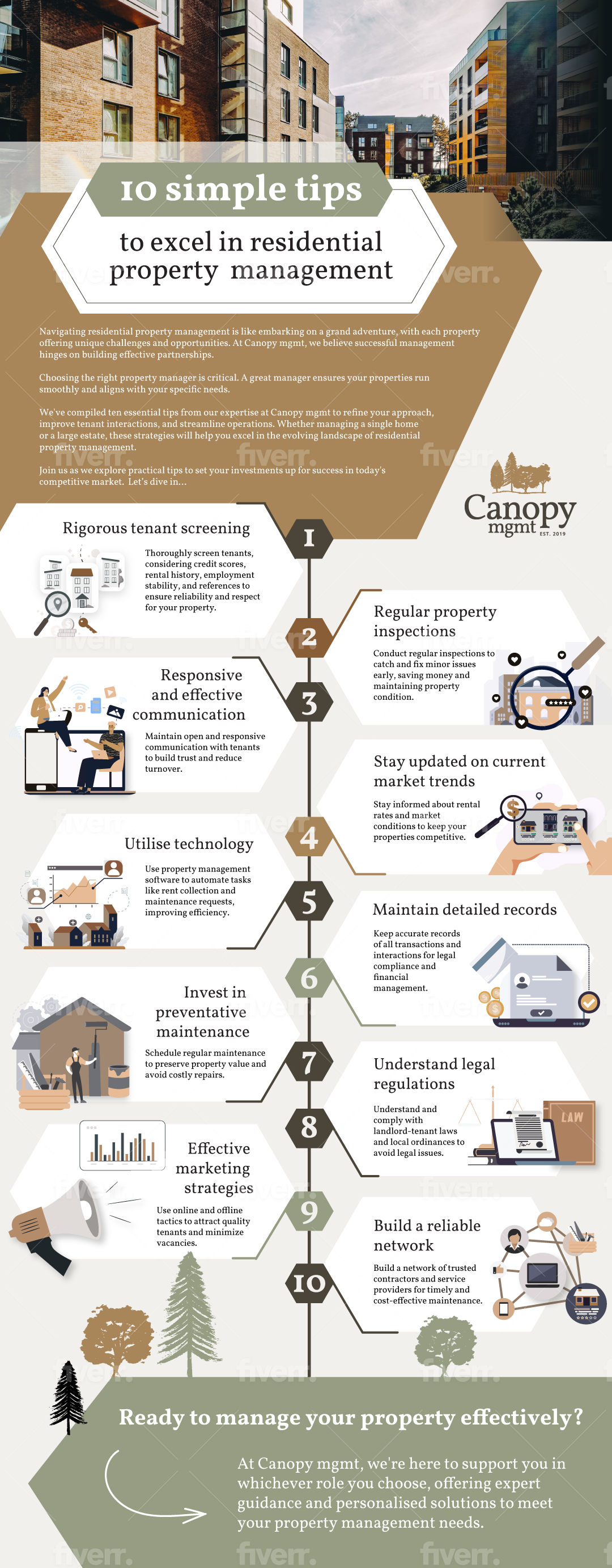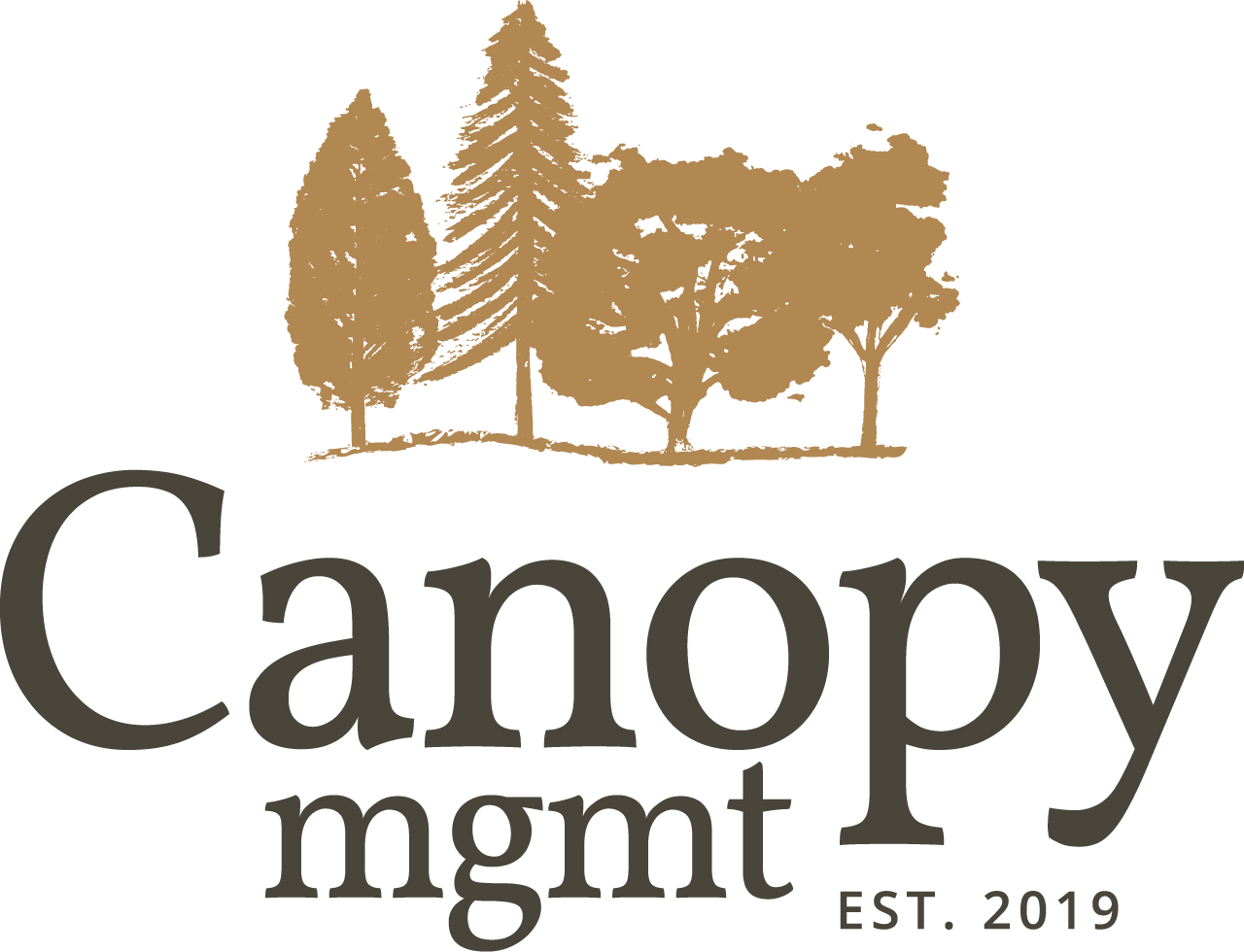How to master the art of managing properties and streamline your operations
Navigating the intricacies of residential property management is very much like setting out on a grand adventure. Each property you manage brings its own challenges and opportunities, making it more important than ever to have the right team by your side. At Canopy mgmt, we believe that successful residential property management hinges on more than just good practices—it’s about building effective partnerships.
Choosing the right property manager is one of the most critical decisions you can make. A great property manager acts as the linchpin in your investment strategy, ensuring that your properties run smoothly and efficiently. It’s essential to pick a partner who not only has a solid track record in residential property management but also understands and aligns with the specific needs of you and your property.
With these considerations in mind, we’ve put together a list of ten essential tips that draw on our expertise and firsthand experiences at Canopy mgmt. These tips are designed to refine your management approach, improve your tenant interactions, and streamline your operations. Whether you’re managing a single residential home or a sprawling estate—these strategies will equip you to excel in the ever-evolving landscape of residential property management.
Join us as we explore these practical, transformative tips for residential property management that will benefit both residential management companies and landlords as a whole.
You won’t just excel in handling your properties effectively, you’ll be setting your investments up for success in today’s competitive market. Let’s dive in…
1. Rigorous tenant screening
Ensuring that you select the right tenants for your properties is the most important factor for any successful residential property management strategy. Implementing a thorough tenant screening process helps mitigate potential issues down the line and ensures a smoother and more reliable rental experience. Make sure to look beyond just credit scores and dive into rental history, employment stability, and references to ensure you’re bringing in tenants who are not only financially reliable but also respectful of your property.
2. Regular property inspections
Regular property inspections are a proactive approach to maintenance and can save you significant time and money in the long run. By scheduling routine inspections, you can identify and address minor issues before they escalate into costly repairs—and save you crucial funds in the bigger picture. These inspections also provide an opportunity to check in with your tenants, address any concerns they may have, and ensure that the property is being well looked after.
3. Responsive and effective communication
Open and transparent communication is key to maintaining positive relationships with your tenants. Make sure your tenants know how to reach you in case of emergencies or maintenance issues and be responsive to their inquiries and concerns. Clear communication builds trust and fosters a sense of community, which can lead to happier tenants and lower turnover rates. If your tenant leaves, they can place reviews online about the property they stayed at, and their landlord’s communication—so a positive relationship is good for both parties.
4. Stay updated on current market trends
Just like with everything, the real estate market is constantly evolving, so it’s important to stay informed about current trends and market conditions. To keep updated, we recommend keeping an eye on rental rates in your area, as well as any changes in demand or tenant preferences. By staying ahead of the curve, you can adjust your rental strategies accordingly and ensure that your properties remain competitive in the market—and are always at capacity.
5. Utilise technology
Technology has revolutionised the residential property management industry, making it easier than ever to streamline operations and improve efficiency. Consider investing in property management software that can help you automate tasks such as rent collection, maintenance requests, and tenant communication. These tools not only save you time and effort but also provide valuable insights into your property portfolio.
Read also The power of property management software solutions and how they enhance overall efficiency
6. Maintain detailed records
Keeping detailed records of all your property-related transactions and interactions is necessary for legal compliance and financial management. Ensure you have accurate records of lease agreements, rent payments, maintenance requests, and any other pertinent information. These records not only protect you in case of disputes but also provide valuable data for analyzing your property’s performance—and keeping track of everything all at once. It is important for tenant screening if a past tenant comes back to one of your properties.
If paperwork and staying current with all the tenancy agreements feel overwhelming for you as an individual leasing your property—then reach out to us at Canopy mgmt and we can liaise on all your property management needs.
7. Invest in preventative maintenance
Preventative maintenance is key to preserving the value of your property and avoiding costly repairs down the line. Develop a regular maintenance schedule that includes tasks such as HVAC servicing, gutter cleaning, and pest control. By addressing maintenance issues proactively, you can minimise disruptions for your tenants and ensure that your property remains in top condition.
Read also The top 10 property maintenance services tasks
8. Understand legal regulations
As a property manager, it’s a necessity to have a solid understanding of the legal regulations that govern rental properties in your area. Familiarise yourself with landlord-tenant laws, fair housing regulations, and any local ordinances that may affect your property. Compliance with these regulations not only protects you from legal liability but also ensures a positive rental experience for your tenants.
9. Effective marketing strategies
Marketing your rental properties effectively will attract quality tenants and minimise vacancy rates. Use a combination of online and offline marketing tactics to reach potential renters, including listing your properties on rental websites, creating eye-catching signage, and leveraging social media platforms. Highlight the unique features and amenities of your properties to stand out from the competition and attract the right tenants—and if you aren’t sure where to start, then a property management company would suit you perfectly.
10. Build a reliable network
Developing a network of trusted contractors, vendors, and service providers is essential for maintaining your properties and addressing maintenance issues promptly. Make connections with reliable plumbers, electricians, landscapers, and other professionals who can assist you when needed. Building these relationships not only ensures that you have access to quality services but also allows you to negotiate better rates and prioritise your property’s maintenance needs for its longevity.
Ready to manage your property effectively?
Understanding the distinction between a landlord and a property manager is essential for navigating the world of real estate investments effectively. Landlords, as property owners, often take on the role of managing their rental properties themselves, while property managers serve as dedicated caretakers, ensuring that all aspects of property management are handled with diligence and professionalism. Whether you’re a hands-on landlord or considering the benefits of hiring a property manager, the key is to prioritise the efficient management of your rental space to maximise returns and ensure tenant satisfaction.
At Canopy mgmt, we’re here to support you in whichever role you choose, offering expert guidance and personalized solutions to meet your property management needs.


